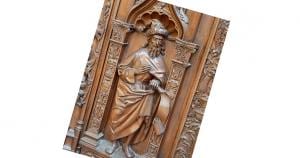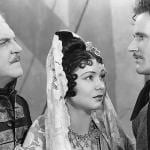 A perpetual error of humankind is to think that knowing the future would help us prevent some evil. Start with Homer and realize that the men of Troy knew they were doomed, but could not act to free Helen and get rid of Paris. There are many reasons for this, somethings are willed by God, some are necessary due to natural causation, but human cussedness plays a large role.
A perpetual error of humankind is to think that knowing the future would help us prevent some evil. Start with Homer and realize that the men of Troy knew they were doomed, but could not act to free Helen and get rid of Paris. There are many reasons for this, somethings are willed by God, some are necessary due to natural causation, but human cussedness plays a large role.
We do not need a curse on our Cassandra to ignore her true prophesies: merely human stubbornness and pride. Assume for a moment that the Christian faith is true and future foretelling is possible. Beware. Knowing the future can be fatal, ask MacBeth. He heard the future foretold and speculating on the knowledge gnawed at the weak parts of his mind until he fell into folly, murder, and ruin. Could he have been king without murder? We shall never know since he used the “prophesy” of witches to justify an evil deed.
Shakespeare’s Richard of York (Richard III of England) is my favorite literary example. The saintly king Henry VI prophesies his murderous rule and his ultimate failure, but Richard’s response is to stab the messenger:
RICHARD I’ll hear no more. Die, prophet, in thy speech, He stabs him For this, amongst the rest, was I ordained. KING HENRY Ay, and for much more slaughter after this. O, God forgive my sins, and pardon thee. He dies*
When all is well in the Kingdom, knowing he cannot be a hero in such times:
And therefore since I cannot prove a lover To entertain these fair well-spoken days, I am determined to prove a villain And hate the idle pleasures of these days. Plots have I laid, inductions dangerous, By drunken prophecies, libels and dreams To set my brother Clarence and the King In deadly hate the one against the other.
He should know he cannot win, but like all fools, the category contains all tyrants, Richard believes he can slip his fate. Richard might repent and so change some of his doom, but Richard is the sort of man who cannot repent from power. He knows the future, but he does not know himself. His character, not his physical disabilities, are his doom.
Shakespeare, ever the master, has Richard trap the better man Edward with prophesy.
Edward makes another common mistake regarding prophesy. He does not presume to ignore his doom like Richard. Instead, he becomes obsessed with understanding what is always unclear and uncertain. Richard has laid a trap:
By drunken prophecies, libels and dreams To set my brother Clarence and the King In deadly hate the one against the other. And if King Edward be as true and just As I am subtle false and treacherous, This day should Clarence closely be mewed up About a prophecy which says that ‘G’ Of Edward’s heirs the murderer shall be. Enter George Duke of Clarence, guarded, and Sir Robert Brackenbury Dive, thoughts, down to my soul: here Clarence comes. Brother, good day. What means this armèd guard That waits upon your grace?**
Edward becomes obsessed with understanding this ambiguous prophesy. As a result, he behaves stupidly just like more than author of “end times” prophesy books today. Edward cuts himself off from his ally George, because he thinks (somehow) he can be clever and avoid God’s will.
Edward does not understand that a man can be good, ask for mercy, and so avoid God’s judgment, but a man cannot avoid history. Sometimes other people use their free will to do evil or the cosmos is already headed, inexorably by natural law, in a certain direction. God’s will be done. We can do good and so be righteous in difficult times, but we cannot avoid all famines, plagues, and evils in this broken world. The attempt to do so by “reading the signs of the times” will, as Edward shows, simply empower villains. Half the time the “prophesy” we follow is a con by bad men and the other half of the time we have misread the truth.
A true Biblical prophet is not in the business of future foretelling, but of speaking the word of the Lord to his generation. Because God is a great poet, a person who is rational and moves in patterns, this can often tell us what the future will be, but not in a way that is predictable. Virgins conceive and bear sons, some young women, the Mother of God, was a true Virgin. Every word of true prophesy has immediate meaning and future echoes, some greater than the immediate fulfillment. Edward ignores this looking for the cheap trick of the fraudulent psychic with cold reads and mumbo jumbo. As a result, he plays into the hands of a villain, the ruinous Richard, who will himself ignore the true nature of prophesy until damned.
Shakespeare is deeply Christian. He knows that after an event the pattern is plain:
”This is that spoken of by the prophet . . .”
The prophesy comforts us in the regularity of history. What seems a singularity to us, this amazing birth, is shown to be a pattern that fits the flow of sacred history. We can believe in it, because it is not, after, so extraordinary, but pattern of wonder!
God help us all to know that . . . So it goes.
—————————————————-
*Shakespeare, Henry VI, Part 3. 5.6.
**Shakespeare, Richard III. 1.1.












